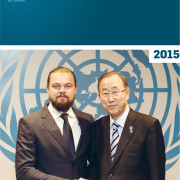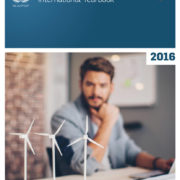Global Compact International Yearbook 2016 published
The idea of sustainability is based on the certitude that we have planetary boundaries. The WWF vividly illustrates this with “Earth Overshoot Day.” It describes the day of the year on which human demands on natural resources exceed the capacity of the earth to reproduce these resources.
„We need new ways of living that will end the suffering, discrimination and lack of opportunity that define the lives of billions of people around the world, and that drive instability and conflict,“ says Ban Ki-moon, UN secretary General in his note in the new „Global Compact International Yearbook“, edition 2016.
What does this mean for corporate sustainability? Business must fit into planetary boundaries. This probably will not work with traditional business models. That is why we need new, fresh ideas. We need change, even when it happens in a rough, disruptive way, and the earlier the better. When you talk about the Sustainable Development Goals, you have to talk about sustainable innovation. The SDGs are the agenda, innovation is the pathway.
The focus theme of the Global Compact International Yearbook 2016 therefore is sustainable innovation, dividing the topic into the chapters disruption, decarbonization, talents and future markets. This categorization corresponds to this years SDG approach of the World Economic Forum (WEF).
Other issues of the yearbook are:
Changemaker
Be the change that you wish to see in the world, Mahatma Ghandi said. In a time of profound political, environmental, and social upheavals, examples are more important than ever. In our category “Changemaker,” we introduce women and men who are making credible contributions to sustainable development. Most of us desire change, but there is only a small group of people who are acting to make that change happen. That makes them exceptional. And we are proud to introduce them through interviews and individual profiles.
With interviews and portraits of
• Angelina Jolie
• Alejandro Aravena
• Navi Radjou
• Robert Redford
• Sigourney Weaver
• Peter Singer
• Mina Guli
• Kevin McCloud
Cities of the future
To navigate the big challenges of the next decades, cities must be innovative, flexible, livable, and sustainable. By 2050, seven out of ten people on earth will live in cities. Urban living will be the norm, but life for many of these roughly 6 billion people will be everything else but normal. Water, waste, and transportation problems; the lack of housing, jobs, and security; and access to education, participation, and information will be just some of the challenges.
Future cities will not automatically be romantic, smart, zero-emissions sites. It is rather hard work to make cities places worth living in. on the path, many questions have to be answered: Where will our food come from? How can we overcome gridlock? How can we motivate locals for sustainable lifestyles? Can we create sharing cities? What do green buildings and green neighborhoods look like? Answers to these and other questions are given in our section “City of the Future.”
Good Practices
Corresponding to the idea of mutual learning, the Global Compact International Yearbook includes 29 good practices of corporate participants that showcase different approaches to the implementation of the 17 Sustainable Development Goals in accordance to the Ten Principles of the Global Compact. The Global Compact International Yearbook is a product of the macondo publishing and United Nation Publications in cooperation with the Global Compact Offices and networks around the world.
GLOBAL COMPACT INTERNATIONAL YEARBOOK 2016
Münster/New York 2016: 164 pages, paperback
macondo publishing/UN Publications
Subscription: 30.00 USD (reg.) 15.00 USD (red.)
ISBN 13: 978-3-946284-01-7
ISSN-Print: 2365-3396
ISSN-Internet: 2365-340x
About the United Nations Global Compact International Yearbook
The Global Compact International Yearbook is a product of macondo publishing in support of the UN Global Compact and the advancement of corporate sustainability globally. The aim of the Yearbook is to create a global overview of the achievements of the UN Global Compact. As an independent publication, it offers proactive and in-depth information on key sustainability issues to stakeholders, and promotes unique and comprehensive knowledge-exchange and learning in the spirit of the Global Compact Principles. The publication helps to advance transparency, promotes the sharing of good practices, and provides a strong voice to the regional and global actors who are at the heart of the initiative. www.international‐yearbook.com





